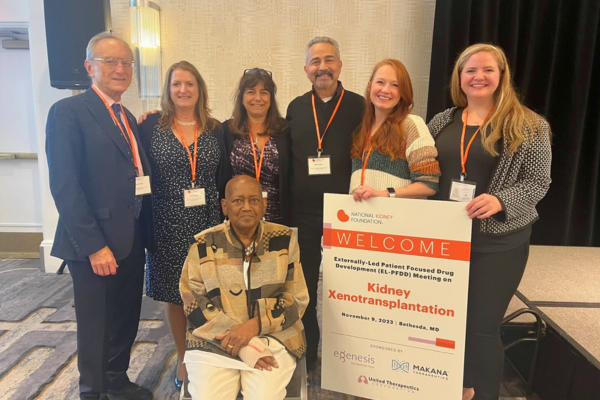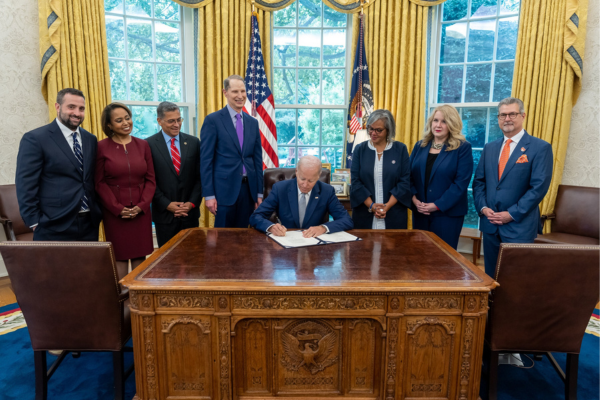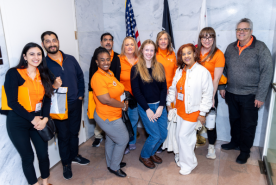November 20, 2025
We’ve seen exciting progress in kidney care over the past five years. From making transplants easier to improving early testing and fairness in care, NKF has helped lead the way.
“How NKF Got Here" is a series highlighting NKF’s most significant achievements over the decades. Explore the full collection of articles.
2020: Lifetime Medication Coverage and COVID-19 Response
- NKF testified before the U.S. House Energy and Commerce Health Subcommittee to support the Comprehensive Immunosuppressive Drug Coverage for Kidney Transplant Patients Act. This bill passed, giving transplant patients lifetime Medicare coverage for the medicines that protect their new kidneys.
- NKF launched the Pediatric Risk Calculator to help healthcare teams better assess children’s kidney disease progression.
- During the COVID-19 pandemic, NKF created educational tools to help patients stay safe and advocated for transplant surgeries to be considered “essential.” NKF also helped fix dialysis supply shortages and worked with the FDA on new treatments for early-stage kidney disease.
Help us unravel the silent threat and rewrite the future of kidney health.
This season of giving, you have the power to rewrite the odds for patients and families facing kidney disease. With your generosity, we’re able to:
- Equip patients and families with knowledge, resources, and access to high-quality care.
- Advocate for policies that address disparities and prioritize kidney health for all.
- Fund research and technology to advance early detection, improve treatment, and expand transplant access.
2021: Promoting KIDNEY EQUITY FOR ALL™
- NKF and the American Society of Nephrology (ASN) announced a new race-free eGFR equation that makes kidney testing more fair and accurate for everyone. Read about the race-free eGFR equation.
- NKF launched the NKF Innovation Fund, which supports new ideas and technology to improve kidney health. Learn about recent NKF Innovation Fund investments.
- NKF created the first-ever national registry for all people with kidney disease.
2022: Expanding Transplant Access

- NKF helped convince federal health officials to allow people living with HIV to donate and receive kidneys from others with HIV.
- U.S. Laboratories endorsed the new race-free eGFR equation. Labs across the country began to adopt the race-free eGFR equation, following this and the NKF-ASN Task Force recommendations.
- NKF hosted the First Scientific Workshop on Xenotransplantation, which gave patients and caregivers the chance to share their thoughts on animal-to-human kidney transplants.
- NKF CEO spoke at the Senate Hearing on the United States Network for Organ Sharing (UNOS), urging reform of the U.S. organ donation and transplant system—citing outdated technology, inefficiency, and inequity—to ensure every patient in need of a kidney transplant can receive one through a transparent, accountable, and patient-centered process
2023: Strengthening the Transplant System

- Thanks in part to NKF’s advocacy, Congress passed the Securing U.S. Organ Procurement and Transplantation Network (OPTN) Act, which will make the transplant system work better for everyone.
- Through a partnership with the National Kidney Registry, NKF announced the milestone of reaching 100 successful kidney transplants in just one year through the Donor Connect Peers Program.
- NKF gathered patient input for the FDA on xenotransplantation and shared it with Massachusetts General Hospital, which later performed the first xenotransplant on a living person.
- Another new effort, NKF’s KidneyCARE (Community Access to Research Equity)™ Study, began collecting patient data to help researchers design better treatments.
- NKF launched its KIDNEY EQUITY FOR ALL™ campaign at the Congressional Hispanic Caucus Institute's Leadership Conference Exhibitor Showcase and the Congressional Black Caucus Foundation Annual Legislative Conference (CBCF-ALC) Exhibitor Showcase in Washington, D.C.
2024: New Discoveries and More Transplants

- The first genetically edited pig kidney transplant was performed on a living person.
- TIME named Dr. Cynthia Delgado and Dr. Neil R. Powe—co-chairs of the NKF/ASN Task Force on Reassessing the Inclusion of Race in Diagnosing Kidney Diseases—among the 100 most influential people in global health for their work to eliminate racial bias in kidney disease diagnosis and improve transplant access.
- NKF launched NKF Patient Journey, a new tool to help people living with CKD learn about their condition based on their personal health status.
- A new device was approved to help children with acute kidney injury caused by infections.
- NKF unveiled new recommendations for genetic testing in kidney disease. About 10% or more of kidney diseases in adults and about 70% of certain chronic kidney diseases in children are expected to be explained by genetic causes.
- NKF updated its CKD Spotlight Data Dashboard to help healthcare professionals recognize and improve kidney care disparities in their own communities.
- NKF released updates to the Change Package to help healthcare professionals improve CKD care.
- Thanks in part to NKF’s advocacy, race-based factors were removed from the Kidney Donor Risk Index, making organ matching fairer for everyone.
2025: Early Detection and Prevention

- NKF celebrated 75 years of improving kidney health and saving lives. Since 1950, NKF has led the way in raising awareness, advancing research, supporting patients, and advocating for better kidney care. The anniversary highlighted decades of progress in early detection, living donation, and equity in transplant access—while looking ahead to a future where fewer people develop kidney disease.
- In the first year of the KidneyCARE™ Study, more than 1,000 people with kidney disease joined from across the U.S.
- NKF called on the World Health Assembly to formally recognize kidney disease as a major global health priority, elevating it to the same level as heart disease, cancer, and diabetes.
- NKF partnered with Sanford Health to help find kidney disease earlier in patients with diabetes. This program helps more people get tested and receive medicines like SGLT2 inhibitors, which can slow down kidney damage.
- NKF continues to advocate for kidney patients and provide resources throughout the 2025 budget cuts, layoffs, and shutdown.









